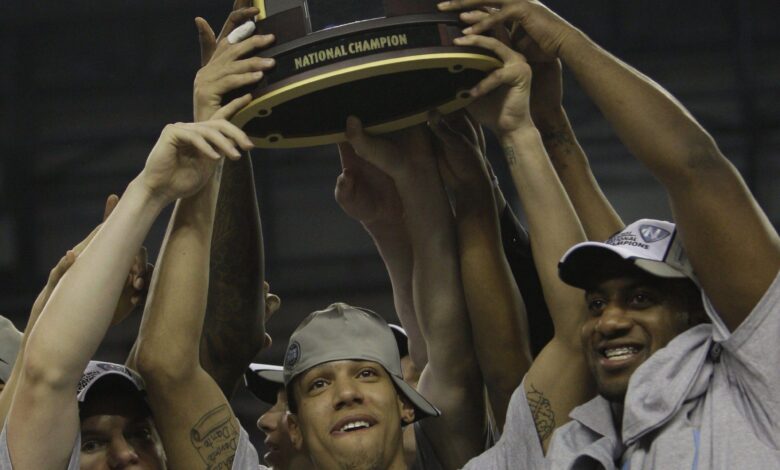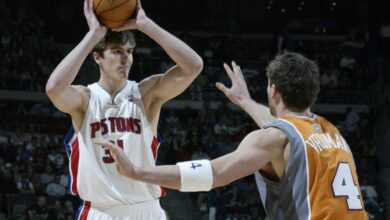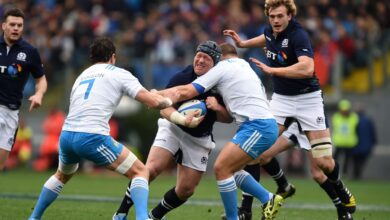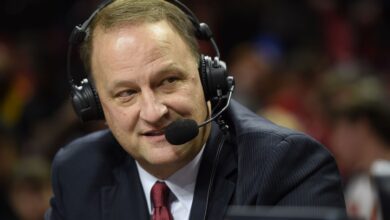Jordan, Jabbar, Russell and Magic won NCAA and NBA titles, but it’s become a rare feat

[ad_1]
Even into the 1980s, the hallmark of a successful NBA player could partially be traced to his college team’s track record.
Many of the stars of their generation won both NBA and NCAA championships, including Michael Jordan, Bill Russell, Kareem Abdul-Jabbar and Magic Johnson. But once the high-school-to-NBA pipeline became popularized, the number of amateur champions who accomplished the feat professionally dwindled.
And since women’s basketball became organized at the collegiate and pro levels, the odds of a woman winning a WNBA championship after a NCAA title are greater than a male player’s chances.
Thirty-two men’s players have won at both levels – over a much larger sample size – according to USA TODAY Sports research. In considerably less time, there have been 14 dual champions in women’s basketball.
Here’s a closer look at the trends.
‘One-and-done,’ other factors limit men’s NCAA champions
When the NBA instituted what had become known as the “one-and-done” rule in 2006, players were required to be 19 years old to enter the draft. Most of the top prospects continued going the college route, despite the lure of pursuing a season in Europe or other professional routes (such as the G League).
The lone superstar from the current era to pull off the feat of titles at both levels is the Los Angeles Lakers’ forward Anthony Davis, who brought John Calipari and the Kentucky Wildcats the 2012 NCAA men’s championship and won his first professional title in October.
Davis isn’t the only one on the men’s side to do it recently, but he is the only All-Star to win at both levels since Rip Hamilton (national championship at Connecticut, NBA title with Detroit Pistons). Quinn Cook has been on two of the last three NBA championship squads and was a senior on the Duke Blue Devils championship team of 2015.
Other men’s players who accomplished the feat in the 21st century include Danny Green. The three-time NBA champion (with three different teams – Spurs, Raptors, Lakers) won the 2009 NCAA championship at North Carolina under recently-retired coach Roy Williams. Green’s style – strong perimeter defense, proficient three-point shooting – helped him find his role on teams that could win.
“I think I learned at an early stage early on and high school how to be that piece,” Green told USA TODAY Sports by phone Friday.
The former second-round draft pick found it fitting that he and Cook were part of Davis’ first NBA title. “Me and Quinn have had some recent (conversations) before about getting it done,” he said. “I didn’t realize AD was a part of that. Now he is a part of that conversation. That’s pretty special.”
Jason Terry (Arizona, 1999) and Corey Brewer (two NCAA titles at Florida, 2006 and 2007) won their NBA rings together with the Dallas Mavericks in 2011. In the cases of Green and Brewer, they were part of college teams with cores that stuck around in pursuit of winning – something that doesn’t happen often in the modern men’s college basketball landscape.
It’s difficult to build the chemistry to win in one season, especially if the star player is an 18- or 19-year-old freshman, as future NBA stars often are.
“With each team, you’d like to see some guys who did some college (winning), to experience it on both levels,” Green told USA Today Sports, “but it’s just kind of starting to fade because less guys are doing college years, so it’s harder to find those.”

Draft rules mean women’s players have more time to win NCAA titles
The NCAA women’s basketball tournament didn’t start until 1982; the WNBA will begin its 25th season later this year. Both of those factors are reasons why the women’s list is much shorter than the men’s, although the frequency is certainly higher.
Similar to the early stages of the NBA, the names associated with women’s basketball burst onto the scene as college players and continued their greatness in the pros. Women’s players cannot leave after their freshman year. WNBA draft rules specify that players “be at least 22 years old during the year in which the draft takes place and has no remaining college eligibility or renounces any future college eligibility.”

Then there’s the Connecticut factor. Coach Geno Auriemma built a powerhouse that attracts the top high school talent, some of whom have gone on to become the faces of women’s basketball. Sue Bird is an 11-time All-Star and four-time WNBA champ. Swin Cash won three pro titles and made four WNBA All-Star teams. Diana Taurasi is a MVP, nine-time All-Star and three-time WNBA champion. Other Huskies Maya Moore, Asjha Jones, Breanna Stewart, Kara Wolters and Renee Montgomery also distinguished themselves as multi-level champions.
It’s not just the UConn greats who reached the top of the sport at the next level. Sheryl Swoopes, who won the a NCAA title during her senior year at Texas Tech, went on to be a four-time champion and six-time All-Star. Cynthia Cooper, a four-time WNBA Finals MVP with the Houston Comets (she was a regular season MVP twice), captured a pair of NCAA titles with the USC Trojans in the 1983 and 1984.
More recent stars such as Candace Parker (Tennessee), Britney Griner (Baylor) and Tamika Catchings (Tennessee) are also on the list. All but one of the 14 (Wolters) went on to be named WNBA All-Stars.
List of players with NCAA, professional championships
Men
Kareem Abdul-Jabbar (UCLA 1967, 1968, 1969; Milwaukee Bucks 1971, Los Angeles Lakers 1980, 1982, 1985, 1987, 1988)
Lucius Allen (UCLA 1967, 1968; Milwaukee Bucks 1971)
Bob Cousey (Holy Cross 1947; Boston Celtics 1957, 1959, 1960, 1961, 1962, 1963)
Arnie Ferrin (Utah 1944; Minneapolis Lakers 1949, 1950)
Danny Green (North Carolina 2009; San Antonio Spurs 2014, Toronto Raptors 2019, Los Angeles Lakers 2020)
Frank Ramsey (Kentucky 1951; Boston Celtics 1957, 1959, 1960, 1961, 1962, 1963, 1964)
Marreese Speights (Florida 2007; Golden State Warriors 2015)
Bill Russell (San Francisco 1955, 1956; Boston Celtics 1957, 1959, 1960, 1961, 1962, 1963, 1964, 1965, 1966, 1968, 1969)
Shane Battier (Duke 2001; Miami Heat 2012, 2013)
Magic Johnson (Michigan State 1979; Los Angeles Lakers (1980, 1982, 1985, 1987, 1988)
Glen Rice (Michigan 1989; Los Angeles Lakers 2000)
K.C. Jones (San Francisco 1955, 1956; Boston Celtics 1959, 1960, 1961, 1962, 1963, 1964, 1965, 1966)
Richard Hamilton (Connecticut 1999; Detroit Pistons 2004)
John Havlicek (Ohio State 1960; Boston Celtics 1963, 1964, 1965, 1966, 1968, 1969, 1974, 1976)
Jason Terry (Arizona 1997; Dallas Mavericks 2011)
Michael Jordan (North Carolina 1982; Chicago Bulls 1991, 1992, 1993, 1996, 1997, 1998)
Gail Goodrich (UCLA 1964, 1965; Los Angeles Lakers 1972)
Antoine Walker (Kentucky 1996; Miami Heat 2006)
Bill Walton (UCLA 1972, 1973; Portland Trail Blazers 1977, Boston Celtics 1986)
Isiah Thomas (Indiana 1981; Detroit Pistons 1989, 1990)
James Worthy (North Carolina 1982; Los Angeles Lakers 1985, 1987, 1988)
Jerry Lucas (Ohio State 1960; New York Knicks 1973)
Henry Bibby (UCLA 1970, 1971, 1972; New York Knicks 1973)
Keitch Erickson (UCLA 1964, 1965; Los Angeles Lakers 1972)
Jamaal Wilkes (UCLA 1972, 1973; Los Angeles Lakers 1975, 1980, 1982, 1985)
Tom Thacker (Cincinnati 1961, 1962; Boston Celtics 1968)
Quinn Buckner (Indiana 1976; Boston Celtics 1984)
Billy Thompson (Louisville 1986; Los Angeles Lakers 1987, 1988)
Corey Brewer (Florida 2006, 2007; Dallas Mavericks 2011)
Clyde Lovellette (Kansas 1952; Minneapolis Lakers 1954, Boston Celtics 1963, 1964)
Anthony Davis (Kentucky 2012; Los Angeles Lakers 2020)
Quinn Cook (Duke 2015; Golden State Warriors 2018, Los Angeles Lakers 2020)
Women
Sue Bird (Connecticut 2000, 2002; Seattle Storm 2004, 2010, 2018, 2020)
Diana Taurasi (Connecticut 2002, 2003, 2004; Phoenix Mercury 2007, 2009, 2014)
Swin Cash (Connecticut 2000, 2002; Detroit Shock 2003, 2006, Seattle Storm 2010)
Asjha Jones (Connecticut 2000, 2003; Minnesota Lynx 2015)
Maya Moore (Connecticut 2009, 2010; Minnesota Lynx 2011, 2013, 2015, 2017)
Candace Parker (Tennessee 2007, 2008; Los Angeles Sparks 2016)
Tamika Catchings (Tennessee 1998; Indiana Fever 2012)
Britney Griner (Baylor 2012; Phoenix Mercury 2014)
Breanna Stewart (Connecticut 2013, 2014, 2015, 2016; Seattle Storm 2018, 2020)
Sheryl Swoopes (Texas Tech 1993; Houston Comets 1997, 1998, 1999, 2000)
Cynthia Cooper (USC 1983, 1984; Houston Comets 1997, 1998, 1999, 2000)
Ruth Riley (Notre Dame 2001; Detroit Shock 2003, 2006)
Kara Wolters (Connecticut 1995; Houston Comets 1999)
Renee Montgomery (Connecticut 2009; Seattle Storm 2015, Minnesota Lynx 2017)
This article originally appeared on USA TODAY: Jordan, Russell, Magic won NCAA & NBA titles, but it’s become rare feat
[ad_2]
Source link






